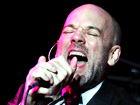
Featured
-
Video | Hollow Man Accelerate
-
Album | Accelerate Warner Bros.
-
News | Simon Cowell-Mentored Leona Lewis Tops Billboard Chart With Spirit
-
News | R.E.M. Accelerate Into The Future After 28 Years Of Songwriting
Full Biography
R.E.M. mark the point when post-punk turned into alternative rock. When their first single, "Radio Free Europe," was released in 1981, it sparked a back-to-the-garage movement in the American underground. While there were a number of hardcore and punk bands in the U.S. during the early '80s, R.E.M. brought guitar pop back into the underground lexicon. Combining ringing guitar hooks with mumbled, cryptic lyrics and a D.I.Y. aesthetic borrowed from post-punk, the band simultaneously sounded traditional and modern. Though there were no overt innovations in their music, R.E.M. had an identity and sense of purpose that transformed the American underground. Throughout the '80s, they worked relentlessly, releasing records every year and touring constantly, playing both theaters and backwoods dives. Along the way, they inspired countless bands, from the legions of jangle pop groups in the mid-'80s to scores of alternative pop groups in the '90s, who admired their slow climb to stardom. It did take R.E.M. several years to break into the top of the charts, but they had a cult following from the release of their debut EP, Chronic Town, in 1982. Chronic Town established the haunting folk and garage rock that became the band's signature sound, and over the next five years, they continued to expand their music with a series of critically acclaimed albums. By the late '80s, the group's fan base had grown large enough to guarantee strong sales, but the Top Ten success in 1987 of Document and "The One I Love" was unexpected, especially since R.E.M. had only altered their sound slightly. Following Document, R.E.M. slowly became one of the world's most popular bands. After an exhaustive international tour supporting 1988's Green, the band retired from touring for six years and retreated into the studio to produce their most popular records, Out of Time (1991) and Automatic for the People (1992). By the time they returned to performing with the Monster tour in 1995, the band had been acknowledged by critics and musicians as one of the forefathers of the thriving alternative rock movement, and they were rewarded with the most lucrative tour of their career. Toward the late '90s, R.E.M. was an institution, as its influence was felt in new generations of bands.
Though R.E.M. formed in Athens, GA, in 1980, Mike Mills (born December 17, 1958) and Bill Berry (born July 31, 1958) were the only Southerners in the group. Both had attended high school together in Macon, playing in a number of bands during their teens. Michael Stipe (born January 4, 1960) was a military brat, moving throughout the country during his childhood. By his teens, he had discovered punk rock through Patti Smith, Television, and Wire, and began playing in cover bands in St. Louis. By 1978, he had begun studying art at the University of Georgia in Athens, where he began frequenting the Wuxtry record store. Peter Buck (born December 6, 1956), a native of California, was a clerk at Wuxtry. Buck had been a fanatical record collector, consuming everything from classic rock to punk and free jazz, and was just beginning to learn how to play guitar. Discovering they had similar tastes, Buck and Stipe began working together, eventually meeting Berry and Mills through a mutual friend. In April of 1980, the band formed to play a party for their friend, rehearsing a number of garage, psychedelic bubblegum, and punk covers in an converted Episcopalian church. At the time, the group was played under the name the Twisted Kites. By the summer, the band had settled on the name R.E.M. after flipping randomly through the dictionary, and had met Jefferson Holt, who became their manager after witnessing the group's first out-of-state concert in North Carolina.
Over the next year and a half, R.E.M. toured throughout the South, playing a variety of garage rock covers and folk-rock originals. At the time, the band was still learning how to play, as Buck began to develop his distinctive, arpeggiated jangle and Stipe ironed out his cryptic lyrics. During the summer of 1981, R.E.M. recorded their first single, "Radio Free Europe," at Mitch Easter's Drive-In Studios. Released on the local indie label Hib-Tone, "Radio Free Europe" was pressed in a run of only 1,000 copies, but most of the those singles fell into the right hands. Due to strong word of mouth, the single became a hit on college radio and topped the Village Voice's year-end poll of Best Independent Singles. The single also earned the attention of larger independent labels, and by the beginning of 1982, the band had signed to I.R.S. Records, releasing the EP Chronic Town in the spring. Like the single, Chronic Town was well received, paving the way for the group's full-length debut album, 1983's Murmur.
With its subdued, haunting atmosphere and understated production, Murmur was noticeably different than Chronic Town and was welcomed with enthusiastic reviews upon its spring release; Rolling Stone named it the best album of 1983, beating out Michael Jackson's Thriller and the Police's Synchronicity. Murmur also expanded the group's cult significantly, breaking into the American Top 40. R.E.M. returned to a rougher-edged sound on 1984's Reckoning, which featured the college hit "So. Central Rain (I'm Sorry)." By the time the band hit the road to support Reckoning, they had become well known in the American underground for their constant touring, aversion to videos, support of college rad






